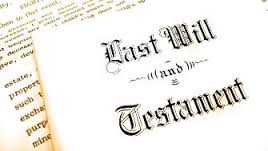 A New Jersey appeals court upheld a substantial fee award exceeding the amount in controversy for work preformed by law firm in a probate litigation when representing the estate of a man manipulated into modifying his will through undue influence because the wrongdoer’s actions contributed to, and greatly increased, the time and effort required to litigate the matter. In the Matter of the Estate of Adrian J. Folcher, Deceased, Docket No. A-1790-12T4 (NJ Appellate Division, June 10, 2014)
A New Jersey appeals court upheld a substantial fee award exceeding the amount in controversy for work preformed by law firm in a probate litigation when representing the estate of a man manipulated into modifying his will through undue influence because the wrongdoer’s actions contributed to, and greatly increased, the time and effort required to litigate the matter. In the Matter of the Estate of Adrian J. Folcher, Deceased, Docket No. A-1790-12T4 (NJ Appellate Division, June 10, 2014)
After the death of his wife, Adrian Folcher married Bernice Tambascia-Folcher in 2002 and later executed wills leaving limited assets to her and the remainder of the estate to his adult children. By 2007, Folcher’s health had deteriorated and he became incapacitated. Folcher was wheelchair-bound or bedridden, and needed assistance walking and using the bathroom. He could not care for himself, and was dependent upon various medications. Tambascia-Folcher cared for him, fed him, and administered his medications. Tambascia-Folcher also began isolating Folcher from family members. At that time, Folcher executed two codicils to his Last Will and Testament and other documents which substantially changed the distribution of his probate and non-probate assets, leaving the bulk of his estate to Tambascia-Folcher. Shortly after the codicils were signed, Folcher died. The will contest was filed after an estate accounting was prepared. The probate litigation continued for 5 years. Following a 13 day bench trial, the court entered judgment in favor of the Estate of Adrian J. Folcher and against Tambascia-Folcher. The trial court also awarded substantial attorney’s fees in favor of the estate. Tambascia-Folcher appealed.
On appeal, Tambascia-Folcher argued, among other things, that the trial court should not have awarded attorneys fees; that the fee award was excessive; and, that the trial court’s award of $377,351 in attorneys fees plus costs was not in proportion to the amount in dispute which, the court found, was approximately $330,000.
The appeals court affirmed the lower court’s rulings in all respects. Regarding the attorneys fee award, the court recognized that New Jersey follows the so-called “American Rule” in which parties are responsible for their own attorneys fees. Importantly, however, the court noted that New Jersey’s court rules provide for reallocation of attorneys fees in certain types of probate and guardianship proceedings where, for example, an executor or trustee commits the “tort” of undue influence, and where a person commits fraud which “results in the development or modification of estate documents that create or expand the fiduciary’s beneficial interest in the estate.”
After analyzing the case, the court found that Tambascia-Folcher was in a confidential relationship with Folcher and exercised undue influence to modify Folcher’s estate documents in order to expand her own beneficial interests. But for her conduct, the court held, the litigation costs and expenses would have been avoided. Her fraud contributed to the erosion of Folcher’s estate, and she, like a corrupt fiduciary, should make the estate whole. The appeals court ruled that when “a party that suffers damages because of the fraudulent acts of another should be entitled to attorney fees to be made whole.”
In addition, the court found that much of the estate’s expense in the probate lawsuit was generated in response to Tambascia-Folcher’s excessive litigational positions. Representing herself pro se, Tambascia-Folcher produced an overabundance of documents that required responses from estate counsel. The court likened Tambascia-Folcher’s actions in the probate litigation to “a scorched-earth campaign” which caused the estate to incur great cost, and justified an award of greater attorneys fees.
The case is annexed here – In the Matter of the Estate of Adrian J. Folcher, Deceased, Docket No. A-1790-12T4 (NJ Appellate Division, June 10, 2014)
For additional information concerning probate litigation and will contests, visit:
https://vanarellilaw.com/will-contests-probate-litigation-elder-abuse-actions/#iplwc
